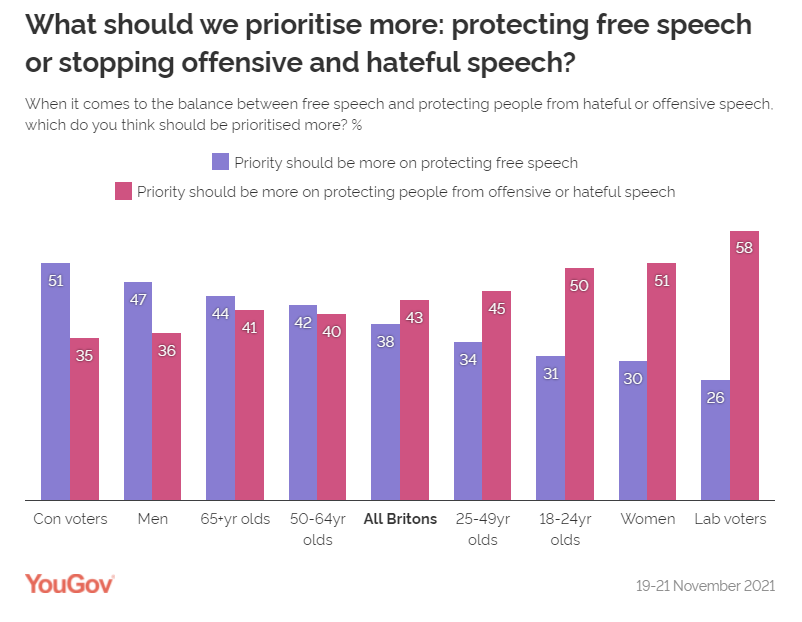You get an ology, you’re a scientist
Jim is an Associate Editor (SUs) at Wonkhe
Tags
As a mild diversion from the timeline offering up endless individually wrapped pieces of Omicron hopium, today’s big news story is Dame Maureen Lipman arguing that comedy is in danger of being “wiped out” due to fears over being cancelled:
All the things that have been cancelled out by being correct are, I’m afraid, all the things that make people laugh.”
That’s quite a sentence – but let’s for a minute assume that Lipman was being quoted out of context or something.
The statistical underpinning of the story comes from new polling from YouGov, which has been asking Britain’s citizens about “cancel culture”.
Just a third of Britons say they think they know what cancel culture means, four in ten have never even heard the expression, and young people are more familiar with it than the old.
But forget the term. It’s the actual self-censorship that matters. It matters particularly to higher education because, having given up on proving that “no platforming” is a real thing, the government’s justification for the Freedom of Speech (Higher Education) Bill is the “chilling effect” of a culture of self-censorship on campus:
Despite the press coverage focus upon high profile speaking events, it is the evidence that a significant proportion of students are self-censoring in relation to lawful views that is most concerning. All students should feel able to both challenge and be challenged by others on campus and this is essential to ensuring an academic environment where all are able to participate without fear of recrimination.
The headlined nugget of “evidence” for this in DfE’s policy paper was a poll published last November that found that 22 per cent of students had hidden views important to them, and 36 percent felt that if they expressed views about some issues important to them their lecturers would treat them differently.
We had a little look at that polling on the site at the time and had a think about how politically motivated surveys of this sort work back in July.
But let’s say that we take the finding in the ADF International polling at face value and we set aside the obvious issues with the framing (surely almost all of us don’t just say everything we think all the time, etc). What we’ve often lacked is comparisons – either to the past (is this worse now or better) or to wider society?
This YouGov polling says that 57 percent of Britons have found themselves stopping themselves from expressing their political or social views for fear of judgement or negative responses from others. And the group with the lowest self-censorship score? 18-24 year olds.
So who knows whether it’s a youth effect, a higher education participation effect or a bit of both. But on the evidence here and in that ADF polling if you’re a student that’s under 24 you appear to be much less likely to be self-censoring.
If everyone else in society would like some advice from universities and their SUs on creating environments where free speech and diverse opinions can be expressed and flourish, I’m sure there’s plenty of people that would oblige.
Over on Twitter, Kent academic Matt Goodwin finds this graphic “rather terrifying”, and encourages us to “look on the right”:

Predictably, some respondents are saying “no Matt, look on the left”, and others are pointing out that charts like that never control for age. Others are pointing out that if you mentally tippex out the bars on the far right, Matt seems to be terrified by women and young people.
I just wonder why polling and discourse keeps making me choose between “free speech” and “protecting people from hateful or offensive speech”, when I find it perfectly straightforward to integrate both principles into my day to day life.

